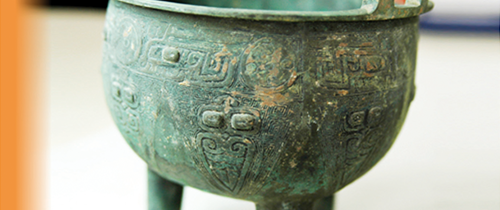Rousselle and Hentze

Erwin Rousselle (1890-1949) became Richard Wilhelm’s successor. Since 1925, he had been professor for German philosophy at Peking University and thus had also been successor of Wilhelm in Peking. Rousselle originally had studied Semitic studies, Iran studies, Indology and law and had only become interested in sinology when he began to look into East-Asian philosophy and buddhology. For this reason, the leadership of the university harboured doubts about Rousselle’s sinological qualifications and asked leading German sinologists to evaluate Rousselle’s academic achievements, an evaluation that produced divided results. Rousselle, however, managed to establish himself as successor to Richard Wilhelm and continued the work of cultural exchange very much in the tradition of his predecessor. He founded the highly valued collection of Chinese arts of the Institute and mainly did research on the history of Chinese religions and philosophy. Similar to Wilhelm, he also dealt with practical topics such as Chinese maritime affairs and fisheries.
The economic recovery of the middle of the 1930s and the financial support of the city of Frankfurt, which at that time financed the university, meant a brief time of flowering for the China Institute, which, however, was overshadowed by the politics of the National Socialist regime. This becomes clear, for example, from the compilation of a Festschrift for the Hamburg sinologist Alfred Forke on the occasion of his 70th birthday in 1937, which was to be published as a special edition of the renowned Sinica. Contributions of “non-aryans,” communists or other authors not palatable to the Nazi-regime were excluded from the outset, among them those of renown scholars such as Gutav Haloun, Hellmut Wilhelm and Étienne (then still Stefan) Balázs. In 1940, Rousselle himself was targeted by the National Socialists. Possibly because of his views of comparative religions related to his work on popular Daoism, he was removed from his post as professor of Chinese studies. He, however, retained the directorship of the China Institute until 1942. At the beginning of the year 1943, Rousselle finally was denied the right to speak at the university.
His successor became the Belgian-born palaeographer, archaeologist and sinologist Carl Hentze (1883-1975), who considered the cross-cultural work of the China-Institute as “humbug,” rejected it and planned to focus on strictly academic research. He mainly worked on early Chinese bronzes from the Shang dynasty. In the course of an air-raid in 1944, the building of the China Institute at the Untermainkai was completely destroyed. Its extensive library and the art collection were lost. This meant that the China Institute and Frankfurt sinology had effectively ceased to exist.




